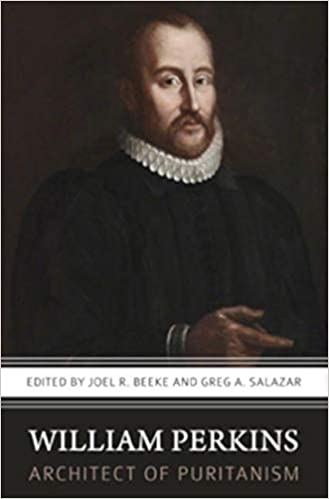A Book Review from Books At a Glance
By Andrew Ballitch
Summary and Review
This little edited volume came out of the conference in May 2017 commemorating the 500th anniversary of the Protestant Reformation. The commemoration was unique not only because it celebrated William Perkins, a lesser known though hugely significant Reformation era figure, but also because it took place in the Round Church in Cambridge, England, formerly the location of Great Saint Andrews where Perkins himself preached weekly for almost twenty years. All five of the contributors to William Perkins: Architect of Puritanism were united around a common theme, the great impact Perkins had on the Puritan movement and its heirs.
Sinclair Ferguson kicks off the volume with chapter 1, “Life and Ministry.” Here he primarily handles Perkins’s plain style preaching, with its intentional application. Ferguson helpfully draws our attention as modern readers to the fact that Perkins understood Scripture to teach that the preaching of God’s word is uniquely used by God and experienced this in his ministry. While he does not break new ground here, he does offer an eloquent and compelling pitch for Puritan preaching methodology.
Geoffrey Thomas’s “Pursuit of Godliness” shows us that a characteristic of Perkins’s mindset was that every Christian ought to be a striver. His offering serves as the closest thing to a biography in the book.
Joel Beeke’s chapter, “The Greatest Case of Conscience,” focuses on the doctrine of assurance, a doctrine eminently in his wheelhouse, and reminds us of Perkins’s insightful distinction between objective and subjective assurance of faith. The appendix that is Perkins’s whole treatise was a nice surprise and exposes readers to a key and pastorally relevant primary source.
“The Wholesome Doctrine of Faith and Love,” Stephen Yuille’s chapter, stands out as a fresh reflection on the question of why Perkins’s sermons on Jude are worth reading. He enumerates 15 reasons, which may nicely be applied to why Perkins in general is of value. A brief sampling: “Perkins’s conviction that the principal work of the Holy Spirit is to illumine what He has revealed in Scripture serves as a corrective for those who are convinced that God’s revelation is something that happens inside of them detached from His Word”; “Perkins’s emphasis on preaching as the principal means by which the Spirit of God exercises His power in the salvation of the people of God (from start to finish) elevates the pulpit to its rightful place”; “Perkins detailed exposition of the doctrine of predestination coupled with his fervent proclamation of the gospel evidences a balance that is missing from many of his so-called admirers.” Chapter 4 is worth the price of the book.
If Yuille’s chapter stands out as a helpful articulation of Perkins’s importance today, Greg Salazar’s “The Primacy of Scripture, Preaching, and Piety” is a welcome argument for his importance historically. Salazar is correct in highlighting the priorities of the authority of Scripture contra Roman Catholicism, the centrality of preaching opposed to conformist emphasis on liturgy and sacraments, and the pursuit of holiness in contrast to antinomianism. These were indeed Puritan priorities, which Salazar zooms out from Perkins to prove.
There are some editorial oversights and a bit of redundancy when it comes to claims about Perkins and biographical details. The latter is easily forgiven given the genesis of the chapters as addresses and the scarcity of biographical information about Perkins that even exists. Originality or uniqueness are limited to the chapters done by Yuille and Salazar. That said, the recollections of Perkins’s preaching, life, and doctrine of assurance, coupled with his importance both today and historically, make this a well-rounded book. It makes for an excellent first recommendation for those interested in William Perkins and Puritanism. In fact, it is probably the best secondary source available in that regard.
Andrew S. Ballitch (PhD, Southern Baptist Theological Seminary) is a pastor at Westwood Alliance Church in Mansfield, Ohio.
Buy the books

WILLIAM PERKINS: ARCHITECT OF PURITANISM, by Joel R. Beeke and Greg Salazar, eds.